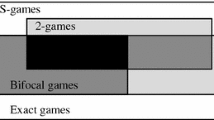Abstract
Two reverse supertasks—one new and one invented by Pérez Laraudogoitia (Philos Stud 168:619–628, 2014)—are discussed. Contra Kerkvliet (Log Anal, 2016) and Pérez Laraudogoitia, it is argued that these supertasks cannot be used to conduct fair infinite lotteries, i.e., lotteries on the set of natural numbers with a uniform probability distribution. The new supertask involves an infinity of gods who collectively select a natural number by each removing one ball from a collection of initially infinitely many balls in a reverse omega-sequence of actions.
Similar content being viewed by others
Notes
The minutes of that meeting can be found on pages 259–260 of Benardete (1964).
In this respect they take inspiration from Pérez Laraudogoitia (2011).
The maximum of \(\{l_1(n)|n\in \mathbb {N}\}\) is the winning number, if it exists. The maximum of \(\{l_2(n)|n\in \mathbb {N}\}\) is not necessarily the value of the penultimate ball; it is the value of the highest-numbered ball that is among the last two; and similarly for \(l_k\) for all \(k\ge 2\).
Even though, of course, under rule R\(_4\) each selection function has probability 0.
In Pérez Laraudogoitia’s original version of this supertask, the coin-tossing ceases after the first tails, rather than the first tails resulting in a dollar coin being replaced with a euro coin. I changed this detail to ensure that there is a way to translate the informal requirement that each coin toss is fair and independent into a formal statement in a way that is neutral between Pérez Laraudogoitia’s position and mine. I hope it is obvious enough that this change facilitates clarity without altering the scenario in any substantial respect: the results of the tosses with euro coins do not affect any other tosses (neither whether a dollar or euro coin is to be used, nor the probabilities of tails and heads) just like the absence of a toss does not affect any other toss (or whether there should be a toss at any given instant of time).
In the last case, it would have to be false, contrary to what Zeno thought, that running a finite but positive distance involves infinitely many constituent actions.
References
Benardete, J. A. (1964). Infinity: An essay in metaphysics. Oxford: Clarendon Press.
de Finetti, B. (1974). Theory of probability. Hoboken: Wiley.
Howson, C. (2014). Finite additivity, another lottery paradox and conditionalisation. Synthese, 191, 989–1012.
Kerkvliet, T. (2016). The supertask of an infinite lottery. Logique & Analyse, 59. http://www.logiqueetanalyse.be/.
Kolmogorov, A. N. (1933). Grundbegriffe der Wahrscheinlichkeitsrechnung. Berlin: Verlag von Julius Springer.
Pérez Laraudogoitia, J. (2011). The inverse spaceship paradox. Synthese, 178, 429–435.
Pérez Laraudogoitia, J. (2014). The supertask argument against countable additivity. Philosophical Studies, 168, 619–628.
Acknowledgements
The reverse supertask of Sect. 1 is, essentially, of my invention. I first presented it in an unpublished paper, from which Timber Kerkvliet learned about it. In my original version, each god halved the number of balls in the collection. Timber Kerkvliet found it simpler to work with the version in which each god just removes a single ball. I also realized that the formalism of this paper would be more elegant with that version, and I therefore adopted it. I have benefitted from discussions about this supertask with Jon Pérez Laraudogoitia, Øystein Linnebo, Martin Jullum, Phil Chodrow, Laureano Luna, Carl Baker, Federico Luzzi, Thomas Brouwer, Andreas Fjellstad, Crispin Wright, John Norton, and Timber Kerkvliet.
Author information
Authors and Affiliations
Corresponding author
Rights and permissions
About this article
Cite this article
Hansen, C.S. On fair countable lotteries. Philos Stud 174, 2787–2794 (2017). https://doi.org/10.1007/s11098-016-0810-4
Published:
Issue Date:
DOI: https://doi.org/10.1007/s11098-016-0810-4




